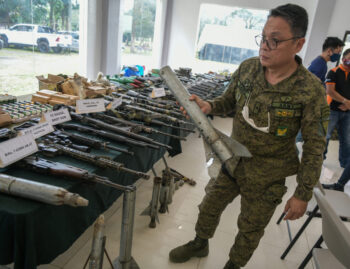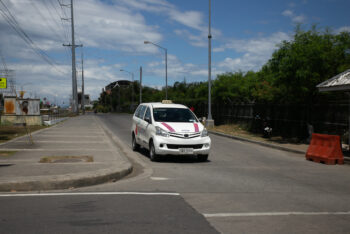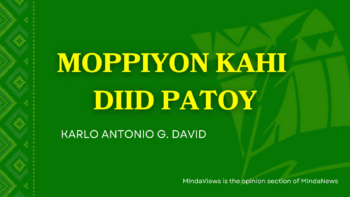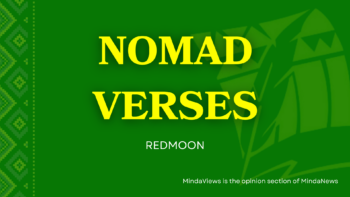
2nd of 5 parts | 1st part
NAGA CITY (MindaNews / 17 April)—All four rebel amnesty Proclamations, under the uniform terms of their respective Section 1 on Grant of Amnesty, cover “crimes in pursuit of their political beliefs, whether punishable under the Revised Penal Code or special penal laws, including but not limited to the following:
- Rebellion or insurrection;
- Conspiracy and proposal to commit rebellion or insurrection;
- Disloyalty of public officers or employees;
- Inciting to rebellion or insurrection;
- Sedition;
- Conspiracy to commit sedition;
- Inciting to sedition;
- Illegal assembly;
- Illegal association;
- Direct assault;
- Indirect assault;
- Resistance and disobedience to a person in authority or the agents of such person;
- Tumults and other disturbances of public order;
- Unlawful use of means of publication and unlawful utterances;
- Alarms and scandals;
- Illegal possession of firearms, ammunition or explosives, provided that these crimes or offense were committed in furtherance of, incident to, or in connection with the crimes of rebellion or insurrection; and,
- Those charged, detained or convicted of common crimes but who can establish by substantial evidence that they have actually committed said crimes in pursuit of political beliefs.” (underscorings supplied)
This appears to be a relatively expansive long list of “political offenses,” i.e., “crimes in pursuit of their political beliefs” or “in furtherance of, incident to, or in connection with the crime of rebellion.” There of course follow further below certain significant exceptions.
It is interesting and laudable that “illegal possession of firearms” that is “in furtherance of, incident to, or in connection with the crime of rebellion” is covered by amnesty, while often enough captured armed rebels are charged just with “illegal possession of firearms” but not with the proper charge of “rebellion” that would or should absorb the “illegal possession of firearms,” such as provided under Section 29 of Republic Act No. 10591 or the Comprehensive Firearms and Ammunition Act of 2013.
It is also interesting and laudable that “Those charged, detained or convicted of common crimes” can be covered by amnesty if the common crimes were committed “in pursuit of political beliefs.” But of course this is later qualified to exclude certain common crimes, as will be seen shortly below.
But Section 1 provides that “the amnesty shall not be granted to those who have already been proscribed or those charged under Republic Act (RA) No. 9372, otherwise known as the Human Security Act of 2007, or RA No. 11479 or the Anti-Terrorism Act of 2020.” Note however that RA 9372 has been repealed and replaced under RA 11479. But conspicuously not mentioned, despite being terrorism-related, is RA 10168 or the Terrorist Financing Prevention and Suppression Act of 2012. The wide application of these anti-terrorism laws may effectively limit, or constitute exceptions to, the granting of rebel amnesties.
Section 1 also provides that “The amnesty granted under this Proclamation shall not cover kidnap for ransom, massacre, rape, terrorism, crimes committed against chastity as defined in the Revised Penal Code, crimes committed for personal ends, violation of RA No. 9165, otherwise known as the Comprehensive Dangerous Drugs Act of 2002, grave violations of the Geneva Conventions of 1949, and those identified by the United Nations as crimes that can never be the subject of amnesty such as genocide, crimes against humanity, war crimes, torture, enforced disappearance, and other gross violations of human rights.” (underscorings supplied)
“Kidnap for ransom,” “rape,” “crimes committed against chastity,” and “crimes committed for personal ends” are examples of “common crimes” which are considered exceptions to rebel amnesty coverage. “Terrorism” is repeated here as such exception, but broadly rather in than in terms of specific anti-terrorism legislation already cited above. The mention of drug offenses as also exceptions is interesting because of its implication of some possible linkage between drug offenses and rebel groups. Since the new Proclamations under President Marcos just basically replicate the preceding Proclamations under President Duterte, the Duterte-type attention given to drug offenses even in a rebel amnesty matter is not surprising.
Most significant and laudable in terms of exceptions to rebel amnesty coverage are the specified crimes of “grave violations of the Geneva Conventions of 1949” (which are considered war crimes) and “genocide, crimes against humanity, war crimes, torture, enforced disappearance” as well as the unspecified crimes of “those identified by the United Nations as crimes that can never be the subject of amnesty” and “other gross violations of human rights.” All together, these have been referred to as “atrocity crimes” in some related literature. The most established atrocity crimes are genocide, crimes against humanity, and war crimes that are precisely the subject of the unmentioned 1998 Rome Statute of the International Criminal Court which describes them as “the most serious crimes of concern to the international community as a whole.” They are also the subject of the unmentioned RA 9851 or the Philippine Act on Crimes Against International Humanitarian Law, Genocide and Other Crimes Against Humanity. Their not being considered as properly “political offenses” is consistent with the excellent Concurring Opinion of Justice Marvic Mario Victor F. Leonen in the Ocampo vs. Judge Abando, et al. (726 Phil. 471).
The 2004 Report of the UN Secretary General on the Rule of Law and Transitional Justice in Conflict and Post-Conflict Societies states that “UN-endorsed peace agreements can never promise amnesties for genocide, war crimes, crimes against humanity or gross violations of human rights.” The latter would normally include “torture” and “enforced disappearance.” Torture and enforced disappearance are the subjects of the unmentioned RA 9745 or the Anti-Torture Act of 2009, and the unmentioned RA 10353 or the Anti-Enforced or Involuntary Disappearance Act of 2012, respectively. These domestic laws however cover only state actor (like soldier and police) perpetrators, not also non-state actor (like rebel) perpetrators, unlike RA 9851 which covers both kind of actors. Conspicuously not mentioned as among the exceptions to rebel amnesty coverage is extra-judicial killing (EJK) but this is certain covered in the phrase “other gross violations of human rights.”
Finally, Section 1 provides that “For purposes of this proclamation, the clause ‘crimes committed in pursuit of a political belief’ shall include, but shall not be limited to, acts and omissions performed or undertaken as part of a plan, program of action or strategy decided by the rebel leadership to overthrow and replace the National Government, any of its political subdivisions, or duly constituted authority, with or without the use of arms.” (underscorings supplied)
There are two aspects to note here, both which would tend to widen the coverage of rebel amnesty. First is “acts and omissions performed… as part of a plan, program of action or strategy decided by the rebel leadership” – which is not qualified as to whether the perpetrator was aware or not of the plan, program of action or strategy decided by the rebel leadership, but it could be that the perpetrator was simply following a field commander’s order to perform an act though he/she was not aware that it was part of the leadership’s decided plan, program of action or strategy. Second is “to overthrow and replace the National Government, any of its political subdivisions, or duly constituted authority, with or without the use of arms.” There are two levels here. One is the level of a rebel or political movement with the objective to overthrow the government, with or without the use of arms (like through “people power”). The other is the level of the perpetrator of an act performed as part of a plan, program of action or strategy decided by the rebel leadership, which act is with or without the use of arms (like propaganda except in the case of “armed propaganda units”).
Tomorrow: Time Frames, Surrenders, Admission of Guilt, and Processing
(SOLIMAN M. SANTOS JR. is a retired RTC Judge of Naga City, Camarines Sur, serving in the judiciary there from 2010 to 2022. He has an A.B. in History cum laude from U.P. in 1975, a Bachelor of Laws from the University of Nueva Caceres (UNC) in Naga City in 1982, and a Master of Laws from the University of Melbourne in 2000. He is a long-time human rights and international humanitarian lawyer; legislative consultant and legal scholar; peace advocate, researcher and writer; and author of a number of books, including on the Moro and Communist fronts of war and peace. Among his authored books are The Moro Islamic Challenge: Constitutional Rethinking for the Mindanao Peace Process published by UP Press in 2001; Judicial Activist: The Work of a Judge in the RTC of Naga City published by Central Books in 2023; and his latest, Tigaon 1969: Untold Stories of the CPP-NPA, KM and SDK published by Ateneo Press in 2023.)







